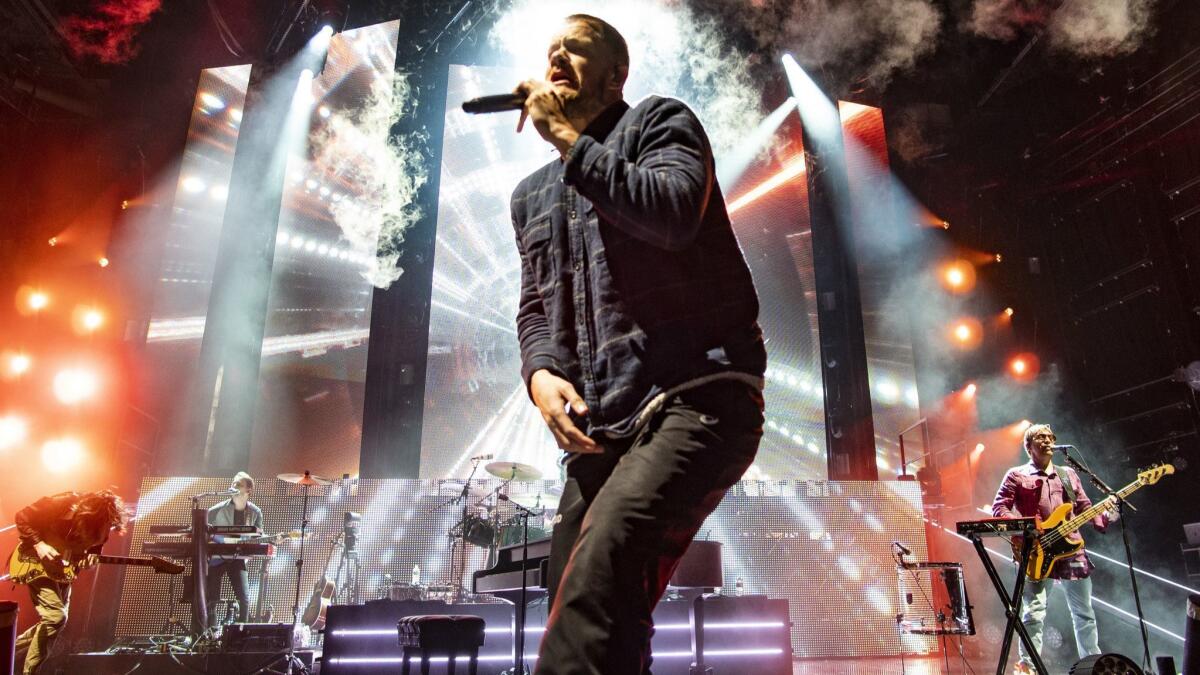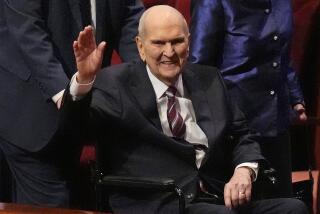Imagine Dragons come to the Forum as rock conquerors, newfound activists

The first time Dan Reynolds felt the price of homophobia in the The Church of Jesus Christ of Latter-Day Saints was on his wedding day seven years ago.
The straight singer and songwriter for the chart-topping rock group Imagine Dragons had grown up in a large, close and fairly orthodox Mormon family. Religion wasn’t just a foundation for his life: It was his culture and, along with music, it provided him a sense of purpose.
So when two of his now-ex-wife’s best friends, who are lesbians, declined to attend their ceremony because of the church’s stance on gay marriage (and particularly its support of Proposition 8, California’s same-sex marriage ban), he felt the human costs of the church’s policies.
“I’d say the greatest disservice and most hurtful thing to youth is people who are indifferent,” Reynolds said. “Even more hurtful than the bigots. That was a heart-wrenching realization for me. That even though I wasn’t homophobic, I didn’t speak up when I’d had the chance to. That I could have wrapped my arms around my [gay] friend from middle school and said ‘God loves you..’”
As he watched youth suicide rates skyrocket over the last decade — in the Church’s home base of Utah, it rose four times faster than than already-rising national rate, according to the Centers for Disease Control and Prevention— Reynolds felt a new urgency to help save the lives of the kids his band played for every night.
In the last two years, he’s grown from a crowdpleasing, red-state-popular rockstar (and, along with Mitt Romney and Brandon Flowers of the Killers, one of the most popular Mormons on the planet) into an outspoken advocate for LGBTQ rights and mental health in one of the most conservative religious communities in America.
He documented this revelation in the new HBO documentary, “Believer,” which follows him as he built the Love Loud festival, a Utah concert designed to open up conversations about LGBT suicide in Mormon communities. The second installment hits Salt Lake City’s 45,000-capacity Rice Eccles Stadium later this month, after his band’s two-night stand at the Forum in L.A. Saturday and Sunday in support of their latest album, “Evolve.”
It wasn’t obvious that his activism would resonate within the Church. As the film’s tough conclusion shows, the road ahead is still long. But Reynolds’ work might be a turning point in convincing Mormons that the crisis is desperate — and to show those affected kids that they’re valuable.
“All sides should be able to say that ‘We can agree that our youth are precious and we need to talk,’” Reynolds said. “Even the farthest-right person should be able to say, ‘I don’t want a gay kid to take their life.’”
For those unfamiliar with the Grammy-winning Imagine Dragons, “Believer” is still a poignant arc about a young man from an insular, largely straight and white community following his faith to unexpected conclusions and activism. In the film, Reynolds isn’t necessarily wrestling with doctrine — he’d always been a relatively liberal Mormon himself — but with understanding the scope of this problem and how best to use his platform.
Its success was far from certain. Even given his band’s stature, Love Loud was on thin ice until it received a tacit blessing from the church before its debut last year. The fest now has a detente with church leadership, which organizers take as a good sign that they’re making progress.
“Mormon culture is very loyal. People had wanted to have this dialogue, but they were hesitant or didn’t feel like they had the experience to be an ally,” said Lance Lowry, executive director of Love Loud. “In just a year’s time, it’s become part of the culture and dialogue here. This wasn’t talked about before, and now we have the catalyst for a conversation.”
Reynolds said his own family was split on his outreach through the Love Loud festival: “My brother is our band’s manager and this was the first project he wasn’t involved in,” he said, a bit ruefully. “I still get countless emails saying ‘You’re making kids gay.’ Both the far left and far right get angry at me for trying to bridge a gap as a straight, white male. I wasn’t educated on all this at first. But I’ve seen too much pain and hurt to sit aside.”
For a lot of LGBT Mormon youth, seeing someone like Reynolds not just take a lead on speaking out but creating a huge music festival around the principle of asserting their dignity, can be literally life-saving.
“We’ve been asking ‘When will there be a Mormon individual who will stand up for this?’ That person is Dan Reynolds, and it’s huge,” said Stephenie Larsen, the chief executve of Encircle, an LGBT youth resource center in Provo, Utah, which appears in the film. “Dan is living his Mormonism to its finest degree. The younger generation has absolutely no issues with LGBT people. If the church doesn’t change, it will lose a generation. But doctrines change in Mormonism, and I expect this change to come too.”
Grassroots movements such as Love Loud’s might be a particularly effective pressure point. The Church has evolved its stances around once-bedrock policies such as polygamy and excluding people of color from priesthood.
“I’m frustrated with these semantics and the politics of it. I’ve met some church leaders who are good-hearted people but feel stuck. Their book tells them one thing, but they feel conflicted. At the end of the day, the church is ripe for change,” Reynolds said. “Do I think it’s safe for LGBT kids in Mormonism today? No. But if I stay in, I can say, ‘Let’s have these conversations as Mormons, because we’re losing our youth.”
The question of “why don’t you leave the faith” is one that has plagued Reynolds and his band throughout this process. It’s one that their friend and Love Loud collaborator Tyler Glenn of Neon Trees wrestled with as he came out as gay, eventually leaving the church and making an album heavy with themes of excommunication and videos with provocative anti-church imagery.
Reynolds said he understood Glenn’s position. But he also has noticed shifts in Imagine Dragons’ audiences since he began his activism that suggests the message is hitting its mark within the community as well as earning laurels outside it.
“One of the most beautiful things is that our shows have become more diverse. So many LGBT people and rainbow flags in the audience and having fans of every color and culture. For me, that’s everything I’d want the band to stand for,” Reynolds said. “LGBT kids can see healthy, powerful adults and say, ‘Maybe it’s OK, maybe I can be like them.”
After this year, there are plans to take Love Loud to more states with youth suicide crises, particularly those affected by religious fundamentalism (the band also has an active pediatric cancer charity, the Tyler Robinson Foundation). Given all the tumult and anxiety in American life right now, it’s an optimistic message aimed at the reddest places on the map, one where a clean-cut band such as Imagine Dragons might be able to speak credibly.
“In one year, in one of the most conservative places in America, we’ve now sold out a football stadium,” Lowry added. “If we can be this successful in Utah, think of what we could do in Texas.”
Reynolds is unwavering in his belief that Mormonism’s earnestness about morality can be flipped into a force for good in LGBT lives.
“Mormons want to be good people. If those conservatives would come spend time with these kids, I believe in the goodness of their hearts,” Reynolds said. “I’ve seen a lot of people say [Mormonism] is misogynist, racist ... so why stay? But what happens after I leave? Nothing. What queer kids does that help?”
More to Read
The biggest entertainment stories
Get our big stories about Hollywood, film, television, music, arts, culture and more right in your inbox as soon as they publish.
You may occasionally receive promotional content from the Los Angeles Times.











